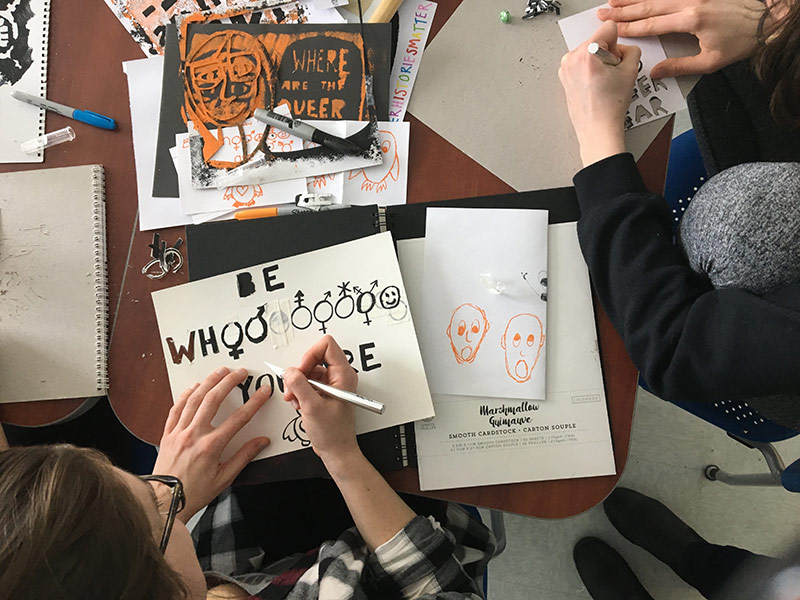Participatory visual research at UNB to address social change
Author: UNB Newsroom
Posted on Aug 1, 2019
Category: UNB Fredericton

Dr. Casey Burkholder, an assistant professor in the faculty of education at the University of New Brunswick in Fredericton, is currently working on two unique research projects that seek to address the inclusion and exclusion of queer, trans and non-binary people within schools, social studies classrooms and curricula, in particular.
Working with both youth and pre-service teachers, Dr. Burkholder’s research aims to impact the practice of teaching LGBTQ+ inclusive histories in social studies within New Brunswick and beyond. Dr. Burkholder works with participatory visual research methodologies to address community issues and push toward social change. These methodologies include cellphilming, which integrates cellphones with video production and thinking more deeply about the practice of producing and disseminating fieldnotes within educational research.
Dr. Burkholder’s first project, Where Are OUR Histories?, is funded by UNB’s University Research Fund and internal Student Employment Experience Development funding, offered through the faculty of education. In this study, Dr. Burkholder works with PhD student Amelia Thorpe and queer, trans and non-binary youth in Fredericton to produce short films shot on a cellphone (cellphilms), stencils and ‘zines (small-circulations of self-published works of original or appropriated texts and images) and other art practices.
The project serves as a space for community building with queer, trans and non-binary youth to express issues that matter in their lives through art production.
“Cellphilms refocus participants’ everyday media-making practices and turns these practices toward an issue of concern,” explains Dr. Burkholder. “Cellphilm production provides a visual component to the research that can be archived with participants online though a video sharing site, such as YouTube and Vimeo, which can encourage discussion about participants’ concerns and community issues.
“The goal is to be transparent, work with participants as knowledge producers and share what participants have to say in an accessible format.”
Dr. Burkholder is also working on a second project, entitled Queering New Brunswick Social Studies. This project, which is funded by a 2018-2020 Insight Development Grant from the Social Sciences and Humanities Research Council, works with pre-service teachers to bring LGBTQ+ histories into New Brunswick social studies education (K-12) through arts-based approaches.
With collaborators Dr. Sabine Lebel (media arts and cultures program, UNB Fredericton), Dr. Matt Rogers (faculty of education, UNB Fredericton) and Dusty Green and Meredith Batt from the New Brunswick Queer Heritage Initiative, Dr. Burkholder hopes to incorporate more conversation and education in social studies classes and curricula about groups that have been traditionally silenced – racial, gender and sexual minorities – in particular black, Indigenous and other New Brunswickers of colour.
“This is a project worth doing,” says Dr. Burkholder. “It addresses the complex histories of people living in the community. Although there are Gender-Sexuality Alliance groups in some high schools and middle schools in New Brunswick, they are not enough.”
Dr. Burkholder adds that in some rural and urban New Brunswick schools, queer, trans and non-binary youth continue to experience multiple sites of violence and exclusion. Additionally, support for elementary-aged queer, trans and non-binary youth is lacking.
“It’s important to do work where you live and focus on creating change around you, while asking the question, ‘what can I do here?’ in relation to research and service that will benefit your community,” she says.
Media contact: Angie Deveau
